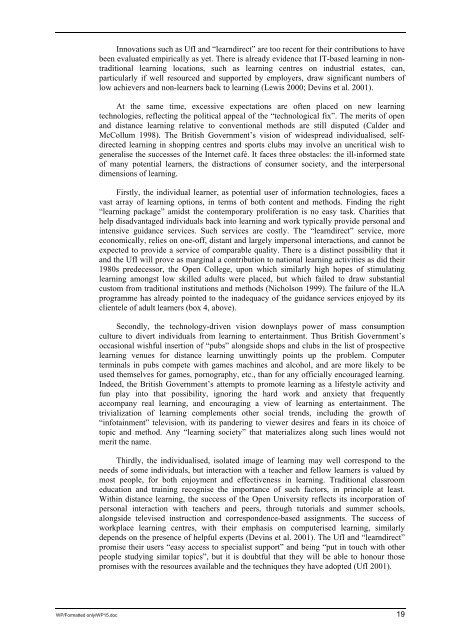Lifelong learning - International Labour Organization
Lifelong learning - International Labour Organization
Lifelong learning - International Labour Organization
You also want an ePaper? Increase the reach of your titles
YUMPU automatically turns print PDFs into web optimized ePapers that Google loves.
Innovations such as UfI and “learndirect” are too recent for their contributions to have<br />
been evaluated empirically as yet. There is already evidence that IT-based <strong>learning</strong> in nontraditional<br />
<strong>learning</strong> locations, such as <strong>learning</strong> centres on industrial estates, can,<br />
particularly if well resourced and supported by employers, draw significant numbers of<br />
low achievers and non-learners back to <strong>learning</strong> (Lewis 2000; Devins et al. 2001).<br />
At the same time, excessive expectations are often placed on new <strong>learning</strong><br />
technologies, reflecting the political appeal of the “technological fix”. The merits of open<br />
and distance <strong>learning</strong> relative to conventional methods are still disputed (Calder and<br />
McCollum 1998). The British Government’s vision of widespread individualised, selfdirected<br />
<strong>learning</strong> in shopping centres and sports clubs may involve an uncritical wish to<br />
generalise the successes of the Internet café. It faces three obstacles: the ill-informed state<br />
of many potential learners, the distractions of consumer society, and the interpersonal<br />
dimensions of <strong>learning</strong>.<br />
Firstly, the individual learner, as potential user of information technologies, faces a<br />
vast array of <strong>learning</strong> options, in terms of both content and methods. Finding the right<br />
“<strong>learning</strong> package” amidst the contemporary proliferation is no easy task. Charities that<br />
help disadvantaged individuals back into <strong>learning</strong> and work typically provide personal and<br />
intensive guidance services. Such services are costly. The “learndirect” service, more<br />
economically, relies on one-off, distant and largely impersonal interactions, and cannot be<br />
expected to provide a service of comparable quality. There is a distinct possibility that it<br />
and the UfI will prove as marginal a contribution to national <strong>learning</strong> activities as did their<br />
1980s predecessor, the Open College, upon which similarly high hopes of stimulating<br />
<strong>learning</strong> amongst low skilled adults were placed, but which failed to draw substantial<br />
custom from traditional institutions and methods (Nicholson 1999). The failure of the ILA<br />
programme has already pointed to the inadequacy of the guidance services enjoyed by its<br />
clientele of adult learners (box 4, above).<br />
Secondly, the technology-driven vision downplays power of mass consumption<br />
culture to divert individuals from <strong>learning</strong> to entertainment. Thus British Government’s<br />
occasional wishful insertion of “pubs” alongside shops and clubs in the list of prospective<br />
<strong>learning</strong> venues for distance <strong>learning</strong> unwittingly points up the problem. Computer<br />
terminals in pubs compete with games machines and alcohol, and are more likely to be<br />
used themselves for games, pornography, etc., than for any officially encouraged <strong>learning</strong>.<br />
Indeed, the British Government’s attempts to promote <strong>learning</strong> as a lifestyle activity and<br />
fun play into that possibility, ignoring the hard work and anxiety that frequently<br />
accompany real <strong>learning</strong>, and encouraging a view of <strong>learning</strong> as entertainment. The<br />
trivialization of <strong>learning</strong> complements other social trends, including the growth of<br />
“infotainment” television, with its pandering to viewer desires and fears in its choice of<br />
topic and method. Any “<strong>learning</strong> society” that materializes along such lines would not<br />
merit the name.<br />
Thirdly, the individualised, isolated image of <strong>learning</strong> may well correspond to the<br />
needs of some individuals, but interaction with a teacher and fellow learners is valued by<br />
most people, for both enjoyment and effectiveness in <strong>learning</strong>. Traditional classroom<br />
education and training recognise the importance of such factors, in principle at least.<br />
Within distance <strong>learning</strong>, the success of the Open University reflects its incorporation of<br />
personal interaction with teachers and peers, through tutorials and summer schools,<br />
alongside televised instruction and correspondence-based assignments. The success of<br />
workplace <strong>learning</strong> centres, with their emphasis on computerised <strong>learning</strong>, similarly<br />
depends on the presence of helpful experts (Devins et al. 2001). The UfI and “learndirect”<br />
promise their users “easy access to specialist support” and being “put in touch with other<br />
people studying similar topics”, but it is doubtful that they will be able to honour those<br />
promises with the resources available and the techniques they have adopted (UfI 2001).<br />
WP/Formatted only/WP15.doc 19

















